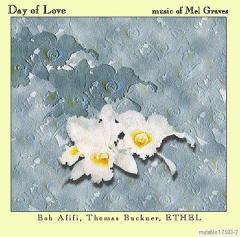MEL GRAVES / Day of Love
Bob Afifi (flute); Thomas Buckner (baritone voice); Mel Graves (bass); ETHEL: Ralph Farris (viola); Dorothy Lawson (cello); Todd Reynolds (violin); Mary Rowell (violin)
This album was the culmination of thirty years' worth of Graves' musical exploration. Ostensibly a jazz album, the disc explores lyrical melodies and instrumental interludes for flute and bass, with rhythms influenced by Brazilian, African and Indian styles. Graves, who died in 2008 wrote over one hundred jazz compositions, and others for various projects over the years. His composition teachers were Loren Rush and Robert Erickson. Graves was a featured composer at Vi Rassegna, Di Nuova Musica in Macerata, Italy and New Music America.
TRACK LIST
Day of Love (for flute, baritone, bass):
Introduction (2:21)
Morning (3:04)
Your Breast Is Enough (7:09)
Adonic Angela (2:15)
Body Of A Woman (4:10)
Bass Interlude (2:51)
Leaning Into The Afternoon ((3:38)
We Have Lost Even (6:05)
The Morning Is Full (4:21)
Global Village (for string quartet):
Dance Of Life-Dance Of The Whirling Dervish (9:41)
Dance Of Death-Dance Of The Shaman (6:51)
Dance Of The Global Village (6:49)
REVIEWS
John Wolfe, Splendid
If you're put off by highly conceptual or outwardly difficult art for art's sake, I advise you to stop reading now and perhaps try looking up "pop" in the Splendid search engine; the last time I checked, it returned 1,275 links, so you'll be in good company (and busy for a while). But for us troubled and seeking souls, there is the music of Mel Graves. An esoteric product of academia if there ever was one, Graves moonlights as a tenured professor at Sonora State University. Day of Love marks his attempt to write an extended song cycle about love and his wife -- but if that sounds run of the mill, then brace yourself, because it's not.
Recorded in 1996, the album is the culmination of thirty years' worth of Graves' musical exploration. Ostensibly a jazz album, the disc explores lyrical melodies and instrumental interludes for flute and bass, with rhythms influenced by Brazilian, African and Indian styles. However, perhaps the most notable influence is poet Pablo Neruda; each song is named after and constructed around a Neruda poem, with each stanza performed in a classic operatic croon.
As the songs take shape around the relatively structured poems, a disjointed atmosphere permeates the album's earlier tracks, with songs like "Morning" and "Ardonic Angela" sounding like a self-consciously "beat" art student spouting off poetry with a pensive affectation of meaning. Rather than playing with the tone of the poetry, these songs attempt to force the verse around their preconceived concepts -- and unfortunately, great art isn't always receptive to lofty reworkings. However, as the album proceeds, songs like "Body of a Woman", "Leaning Into the Afternoon" and the disc's majestic climax, "The Morning is Full", gradually come to parallel the poems; every puff of the flute and pluck of the bass could as easily be a metaphor or a rhyming couplet. You'll appreciate it not for this inter-disciplinary symmetry -- great art, after all, rarely colors within the lines -- but for the relationships it illuminates. Exploration of those concepts is, of course, purely voluntary, but well worth the effort; participative listening is rarely more satisfying.
François Couture, All Music Guide
Jazz bassist Mel Graves is also a gifted contemporary classical composer. Day of Love focuses on this aspect of his work. The title piece is a moving song cycle based on the poems of Pablo Neruda and dedicated to the composer’s wife. The seven songs are scored for flute (Bob Afifi), baritone (Thomas Buckner) and bass (Graves). An instrumental introduction and a bass interlude complete the cycle. The words of Neruda did not only inspire touching melodies, but also brought sounds from South America. Afifi’s flute is central to the work: its aerial lines evoke the Andes, while the bass anchors the piece in jazz and Buckner’s elegant voice brings it into contemporary music. It does not really result in third stream jazz, but in an idiom where all influences are profoundly integrated. Simply put, Day of Love may be Graves’ finest composition, the work of a fully-matured composer. Global Village, an earlier piece (1988, while the previous one dates from 1996), takes the form of a string quartet and is thus less striking. Performed here by ETHEL (Ralph Farris, Dorothy Lawson, Todd Reynolds, and Mary Rowell), it resulted from a commission by the Kronos Quartet. This music is all about movement (the three parts are titled as “dances”), contrasts, and emotion channelled through playfulness. The last movement particularly shares affinities with Boris Kovac’s string quartets. The performance is convincing, but the overall interest of Global Village pales in comparison with the title piece.

